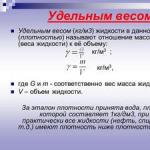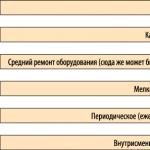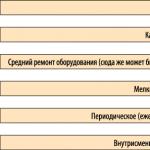Letters e at the end of adverbs. Letters o and e after adverbs hissing at the end
Letters O/E after sizzling adverbs
At the end of adverbs after hissing (sh, h, w, u) under stress spelled ABOUT, without accent - E.
Examples: good ό , sinister e, fresh ό , exciting e.
EXCEPTION: yet yo.
Letters O/A at the end of adverbs
This orthogram is connected with the way of word formation of adverbs.
In adverbs with prefixes in-, on-, for-,, the letter is written at the end ABOUT.
For example: left - V a lion O, right - on rights O, light - behind light O.
In adverbs with prefixes from- (is-), to-, s- (co-), formed from adjectives prefixed-suffixal way, the letter is written at the end A.
For example: distant - from far A, red - before red A, new - With new A.
ATTENTION: if adverbs with prefixes from- (is), before-, with- (co-) formed from adjectives in a suffix way(i.e. adjectives already have a prefix), then
written at the end ABOUT.
For example: before urgent - early O, before verbal - verbatim O, from initial - initially O.
Bibliography
- Razumovskaya M.M., Lvova S.I. and others. Russian language. 7th grade. Textbook. - 13th ed. - M.: Bustard, 2009.
- Baranov M.T., Ladyzhenskaya T.A. and others. Russian language. 7th grade. Textbook. - 34th ed. - M.: Education, 2012.
- Russian language. Practice. 7th grade. Ed. S.N. Pimenova - 19th ed. - M.: Bustard, 2012.
- Lvova S.I., Lvov V.V. Russian language. 7th grade. In 3 hours - 8th ed. - M.: Mnemosyne, 2012.
- Didactic materials. Section "Adverb" ().
- Adverb as a part of speech ().
- Adverb as a part of speech ().
- Parts of speech in Russian ().
- The culture of writing. adverb ().
Homework
Exercises No. 241, 245, 247. Baranov M.T., Ladyzhenskaya T.A. and others. Russian language. 7th grade. Textbook. - M.: Education, 2012.
Task number 1. For these words, select and write down adverbs with the same root with the suffix - o(s). Mark the adverb suffixes.
Fresh, similar, shameless, clumsy, melodious, powerful, viscous, creaky, hot, screaming, calling, trembling, befitting, admonishing, defiant, exhaustive, exciting, prepossessing, admonishing, unblinking, condemning, expectant, refreshing, threatening, understanding, stunning, oppressive, frightening, deafening, all-encompassing, triumphant, exciting, protesting, relaxing, stunning, imploring, impressive, encouraging, reconciling, conquering, alluring, general.
Task number 2. Write off, denoting the conditions for choosing letters - o(s) after adverbs hissing at the end.
Exhausting .., ebullient .., good .., frightening .., questioning .., penetrating .., exhausting .., encouraging .., testing .., blinding .., dense .., annoying .., bribe. ., indignant .., lulling ...
Task number 3. Fill in the missing letters and explain their spelling. Describe the method of word formation.
Step left..., right... overtakes the truck, leave after dark..., long... before the order, get dark..., wipe dry..., occasionally... take an interest, start again..., stay up late..., lick clean..., hastily... have a snack, for a long time... remember.
7th grade. Russian language lesson.
Subject: The letters O and E after the hissing adverbs at the end.
Goals: - to form the ability to highlight the spelling O and E after hissing in adverbs;
Competently solve spelling problems associated with the use of O-E after hissing in words of different parts of speech;
Develop the skill of writing o-e under stress at the end of adverbs;
Develop a sense of beauty;
learn to appreciate cultural values;
Equipment: table O - E and E after sizzling
Lesson type : combined lesson
Repetition: O-E after hissing in other parts of speech.
During the classes
Organizing time
Reflection is positive!
Good morning! The day has begun!
Please stop being lazy!
answer in class and
"Fives" to receive!
Frontal survey passed "Brainstorm"
List the days of the week in order without giving the number or the name of the week. . write in a notebook.
Etymological warm-up. Do you know?
AdverbTomorrow - happened as a result of the merger of the preposition "for" and the existing morning. That is, the next day, after the morning.
AdverbToday was formed by fusion of the old demonstrative pronoun this (this) and the noun of the day. The same pronoun this (this) is preserved in the dialectNow (the same hour).
Game "Third Extra" Stale, cheap, hot! Heavy, fresh, good.
Identify words whose spelling you don't know
Define the new topic and purpose of the lesson. posting a new topic.
Letters O-E after hissing in adverbs.
Class work. Exercise 1
Form an adverb from an adjective, graphically designate the spelling, put the stress.
Move clumsily - clumsily
Finish (brilliant) - brilliant
Talk (good) - good,
hot - hot
Expound (general) - general
Melodious - melodious.
Formulate a rule! In what cases in adverbs after hissing is written E, in which - O. What have we not said?
When we do not hear stress in suffixes,
Then we will certainly write the letter E,
Let the word STILL not confuse anyone,
It is the only exception
group work
Card number 1 for group work.
Match the verbs with adverbs that answer the question how? With O or E at the end after hissing.
Speak, speak, learn, peep, sounds, peer.
Reference words: brilliant, triumphantly good, condemning, testing, convincing.
Card number 2. For group work.
Replace the adverbs with adverbs - synonyms that have the words O or E after the hissing at the end.
Get down to business diligently - clumsily
Loving hard is good, brilliant
Moving awkwardly - hot
Behave boldly - melodiously
Singing loudly - defiantly
Do a great job - judgmental
Look disapprovingly - common
Card number 3 for group work.
Insert letters O or E
"Third Extra"
Common ____, fawning _____, calling ______,
Fresh ___, melodious ____, still ____,
Sinister ____, hot ____, soothing ____,
Stunning___, good____, encouraging___
Individual work.
Cards for individual work
Insert missing letters.
Kryzh ___ vnik, speech ____ nka, lead ___, good ___
Swift ___ m, hat ___, comb ___ k, more ___,
Lead ___, doctor ___, fresh ___
Insert missing letters
Borsch ___, street ___, clothes ___, more ____
Fuck, girl, fuck, hot___
Burnt____, pie___k, pollen___th, common_
Insert missing letters
Tech__t, sh___v, fresh___, ominous___
Singing ___, brick__m, sh__roh,
Yellow, drawing___m, plush, w___h.
Working with the class Task 2 Oral Exercise, 287. Why do many adverbs with this spelling have the suffix YUSCH?
Task 3 Work on the illustration "Winter Day" A Ustinenko page 160 (textbook) Compose a text using adverbs. We write the most beautiful sentence in a notebook and underline the adverb. as part of a proposal.
Graphic dictation
1 2 3 4 5 6 7 8 9 10
Oh oh oh oh oh oh oh
(Doggy, seam, more, hot, stunning, melodious, key, cheap, thicket, liver.)
10 Outcome . Reflection. What is the condition for writing O - E in an adverb. What parts of speech are characterized by the same condition for choosing a vowel? What part of the word?
Briefing home assignments. Paragraph 36. exercise 288 (5 sentences) on assignment
Adverbs with prefixes e-, for-, for-, formed from short adjectives, have a letter at the end o (to the left, dark, tightly), adverbs of the same origin with prefixes to-, from-, from- have a letter at the end A (red-hot, long time ago, on the right).
Adverbs for hissing
At the end of adverbs, after the hissing, a letter is written b, For example: wide open, backwards, backwards.
Exceptions: married, unbearable, really.
Negative adverbs
In negative adverbs, it is written under stress Not, no accent - neither(in both cases the spelling is continuous), for example: no time to rest - never got sick, nowhere to walk - nowhere to work, nowhere to wait for letters - no news came from anywhere.
Continuous spelling of adverbs
Difficulties in writing adverbs are most often associated with the fact that this part of speech is almost continuously replenished with words from other parts of speech, and it is not always possible to establish whether this transition has already ended or whether some combination of a preposition with a noun is halfway to becoming an adverb. Therefore, when using adverbs, one often has to refer to spelling reference books.
We can talk about three types of writing adverbs (including expressions close to adverbs in meaning and syntactic role): continuous, hyphenated and separate.
1. Adverbs are written together, formed by combining prepositions-prefixes with adverbs, for example: until now, utterly, forever, the day after tomorrow. Separately written combinations of prepositions with invariable words used in these cases in the meaning of nouns should be distinguished from these words; compare: Tomorrow the weather has changed(i.e. the next day, in the meaning of the adverb). - Departure scheduled for tomorrow(i.e. for tomorrow, in the meaning of a noun).
Note. About the spelling of pronominal adverbs (why, why, why etc.) see § 61, paragraph 4.
- 2. Adverbs are written together, formed by combining prepositions-prefixes V- And on the- with collective numbers, for example: double, double(But: by two).
- 3. Adverbs are written together, formed by combining prepositions-prefixes with short adjectives, for example: to the right, easily, cleanly, satisfactorily, occasionally, again(see § 53), for a long time, in vain, nearby, briefly, compare: a lot of people(a lot of) at the exhibition it happens - not to meet for many months.
- 4. Adverbs are written together, formed by combining prepositions-prefixes with full adjectives and pronouns, for example:
scatter, saw by hand, search blindly, go at random, play blindly, come close, the result is a draw. But if the adjective begins with a vowel, then the preposition V written separately: openly(see § 58, i. 4).
5. Adverbs are written together, having in their composition such nouns or such nominal forms that are not used in the modern literary language, for example: enough, locked up, soft-boiled, quietly, down to the ground, from the inside, to the ground, obliquely, hastily, on an empty stomach, at random, in reality, by chance, inadvertently, at a distance, across, in half, in the afternoon, behind, outside, early in the morning, half asleep, too much and etc.
Note. Some of these adverbs include nouns, which are also noted in dictionaries as independent words, but which are used very rarely, sometimes in a special context, for example: near(cf.: glasses for distance and for near), from time immemorial(cf.: about old people tell miracles).
6. Adverbs are written together if a definition (adjective, numeral, pronoun) cannot be inserted between the preposition-prefix and the noun from which the adverb was formed without changing the meaning, or if a case question cannot be posed to the noun, for example: in addition, together, instantly, again, around, after, up to, on time, subsequently, half, really, against, soon, out loud, married, towards, out of spite, inside out, on the eve, there, on the contrary, flatly, vying, half, for show, finally, for example, for rent, without fail, along with, forcibly, at random, frankly, in part, in a row, sometimes, involuntarily, in the morning, sideways, immediately, immediately and etc.
Note 1. Many of these adverbs, depending on the context (presence of explanatory words) and meaning, act as a combination of a preposition with a noun and are written separately; compare: do it instantly(instantly) - to be afraid in a moment of danger, to be really pleased(In fact) - believe in the truth, contrary to other people's opinion - salt got into the cut on the arm, return soon(soon) - gain in speed, go towards friends - admire the meeting of friends, do it out of spite - fall upon evil and injustice, put your hat on one side(sideways) - turn on your side(cf. on the right side), be scared to death - go to death, return in the morning(in the morning) - postpone for the morning, the suit is just right(by measure) - arrive on time(on time), etc.
Note 2. The group under consideration and the previous (see and. 5) also include many adverbs in a significant part of the terminological and professional nature, with the prefix V- and final syllable -ku, for the most part they are written together, but there are also cases of separate writing. Written together: chasing, interspersing, interspersed, intermingled, intertwined and etc.
Written separately: in mockery, in installments, Also a curiosity(of another formation) and combinations of different origin in which the noun begins with a vowel: in an embrace, alone(see § 58, i. 4).
7. Adverbs with spatial and temporal meaning are written together, having nouns in their composition top, bottom, front, back, height, distance, depth, breadth, beginning, end, age, although some of them may be preceded by a defining word, for example: up(cf. in the very top), above, upwards, upwards, downwards, downwards, downwards, from below, to the top, in front, back, up, away, away, deep, wide, first, first, completely, finally, forever, forever, forever, forever etc. Separately, these words are written only if there are explanatory words for the indicated nouns in the sentence itself or according to the meaning of the context, for example: to the bottom of the house, into the depths of centuries, into the foggy distance, at the beginning of the lecture, forever and ever, forever and ever, repeat the rule from the beginning(i.e. "from the beginning") cf.: It all depends on where to look at human biography - from the beginning or With end(L. Leonov).
Letters O/E after sizzling adverbs
At the end of adverbs after hissing (sh, h, w, u) under stress spelled ABOUT, without accent - E.
Examples: good ό , sinister e, fresh ό , exciting e.
EXCEPTION: yet yo.
Letters O/A at the end of adverbs
This orthogram is connected with the way of word formation of adverbs.
In adverbs with prefixes in-, on-, for-,, the letter is written at the end ABOUT.
For example: left - V a lion O, right - on rights O, light - behind light O.
In adverbs with prefixes from- (is-), to-, s- (co-), formed from adjectives prefixed-suffixal way, the letter is written at the end A.
For example: distant - from far A, red - before red A, new - With new A.
ATTENTION: if adverbs with prefixes from- (is), before-, with- (co-) formed from adjectives in a suffix way(i.e. adjectives already have a prefix), then
written at the end ABOUT.
For example: before urgent - early O, before verbal - verbatim O, from initial - initially O.
Bibliography
- Razumovskaya M.M., Lvova S.I. and others. Russian language. 7th grade. Textbook. - 13th ed. - M.: Bustard, 2009.
- Baranov M.T., Ladyzhenskaya T.A. and others. Russian language. 7th grade. Textbook. - 34th ed. - M.: Education, 2012.
- Russian language. Practice. 7th grade. Ed. S.N. Pimenova - 19th ed. - M.: Bustard, 2012.
- Lvova S.I., Lvov V.V. Russian language. 7th grade. In 3 hours - 8th ed. - M.: Mnemosyne, 2012.
- Didactic materials. Section "Adverb" ().
- Adverb as a part of speech ().
- Adverb as a part of speech ().
- Parts of speech in Russian ().
- The culture of writing. adverb ().
Homework
Exercises No. 241, 245, 247. Baranov M.T., Ladyzhenskaya T.A. and others. Russian language. 7th grade. Textbook. - M.: Education, 2012.
Task number 1. For these words, select and write down adverbs with the same root with the suffix - o(s). Mark the adverb suffixes.
Fresh, similar, shameless, clumsy, melodious, powerful, viscous, creaky, hot, screaming, calling, trembling, befitting, admonishing, defiant, exhaustive, exciting, prepossessing, admonishing, unblinking, condemning, expectant, refreshing, threatening, understanding, stunning, oppressive, frightening, deafening, all-encompassing, triumphant, exciting, protesting, relaxing, stunning, imploring, impressive, encouraging, reconciling, conquering, alluring, general.
Task number 2. Write off, denoting the conditions for choosing letters - o(s) after adverbs hissing at the end.
Exhausting .., ebullient .., good .., frightening .., questioning .., penetrating .., exhausting .., encouraging .., testing .., blinding .., dense .., annoying .., bribe. ., indignant .., lulling ...
Task number 3. Fill in the missing letters and explain their spelling. Describe the method of word formation.
Step left..., right... overtakes the truck, leave after dark..., long... before the order, get dark..., wipe dry..., occasionally... take an interest, start again..., stay up late..., lick clean..., hastily... have a snack, for a long time... remember.




